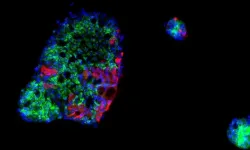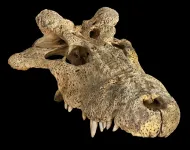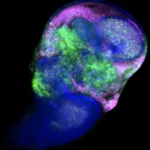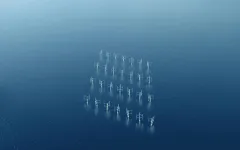Study first to explore combined impacts of fishing and ocean warming on fish populations
Warming and fishing affecting survival of small fish
2021-04-27
(Press-News.org) The combined effect of rapid ocean warming and the practice of targeting big fish is affecting the viability of wild populations and global fish stock says new research by the University of Melbourne and the University of Tasmania.
Unlike earlier studies that traditionally considered fishing and climate in isolation, the research found that ocean warming and fishing combined to impact on fish recruitment, and that this took four generations to manifest.
"We found a strong decline in recruitment (the process of getting new young fish into a population) in all populations that had been exposed to warming, and this effect was highest where all the largest individuals were fished out," said lead author and PhD candidate, Henry Wootton, from the University of Melbourne.
Mr Wootton and his team established 18 independent populations of fish in their lab and exposed these to either control or elevated temperatures, and to one of three fisheries harvest regimes. They then followed the fate of each population for seven generations, which equates to nearly three years of lab time.
"Our study is the first to experimentally explore the joint impact of fishing and ocean warming on fish populations," Mr Wootton said.
The research is released today in the journal PNAS with researchers saying the solution is less selective fishing, which will help ensure balanced sex ratios and the persistence of valuable bigger females.
Co-author Dr John Morrongiello said: "Wild fisheries provide food for billions of people worldwide, particularly in our Pacific region where fish is the major source of animal-based protein. Past fishing practices have caused spectacular fishery crashes and so it is important that we adopt management approaches that will ensure our oceans continue to maintain sustainable fisheries."
He added: "Sustainable fisheries management in the face of rapid environmental change is a real challenge. Getting it right will not only provide food and economic security for millions of people worldwide but will also help protect our ocean's valuable biodiversity for generations to come."
Dr Asta Audzijonyte, co-author from University of Tasmania and Pew Fellow in Marine Conservation, said it was surprising to find such strong and delayed negative impact of warming on small fish survival.
"We still do not fully understand why this happens, but our findings clearly show that protecting fish size diversity and large fish can increase their resilience to climate change. While reversing climate change is hard, restoring and protecting fish size diversity is one thing that we certainly can do, and we need to do it fast," she said.
Dr Audzijonyte added: "Most experimental research on climate change impacts is done on relatively short timescales, where fish are studied for two or three generations at best. We found that strong negative impacts of warming only became apparent after four generations. This suggests that we might be underestimating the possible impacts of climate change on some fisheries stocks."
INFORMATION:
[Attachments] See images for this press release:
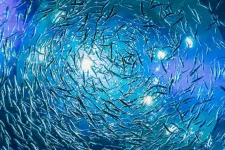
ELSE PRESS RELEASES FROM THIS DATE:
2021-04-27
In an effort to determine the potential for COVID-19 to begin in a person's gut, and to better understand how human cells respond to SARS-CoV-2, the scientists used human intestinal cells to create organoids - 3D tissue cultures derived from human cells, which mimic the tissue or organ from which the cells originate. Their conclusions, published in the journal Molecular Systems Biology, indicate the potential for infection to be harboured in a host's intestines and reveal intricacies in the immune response to SARS-CoV-2.
"Previous research had shown that SARS-CoV-2 can infect the gut," says Theodore Alexandrov, who leads one of the two EMBL groups involved. "However, it remained unclear how intestinal cells mount their immune response to the infection."
In fact, ...
2021-04-27
The building of new homes continues in flood-prone parts of England and Wales, and losses from flooding remain high. A new study, which looked at a recent decade of house building, concluded that a disproportionate number of homes built in struggling or declining neighbourhoods will end up in high flood-risk areas due to climate change.
The study, by Viktor Rözer and Swenja Surminski from the Grantham Research Institute, used property-level data for new homes and information on the socio-economic development of neighbourhoods to analyse spatial clusters ...
2021-04-27
Ship movements on the world's oceans dropped in the first half of 2020 as Covid-19 restrictions came into force, a new study shows.
Researchers used a satellite vessel-tracking system to compare ship and boat traffic in January to June 2020 with the same period in 2019.
The study, led by the University of Exeter (UK) and involving the Balearic Islands Coastal Observing and Forecasting System and the Mediterranean Institute for Advanced Studies (both in Spain), found decreased movements in the waters off more than 70 per cent of countries.
Global ...
2021-04-27
A study led by scientists at the American Museum of Natural History has resolved a long-standing controversy about an extinct "horned" crocodile that likely lived among humans in Madagascar. Based on ancient DNA, the research shows that the horned crocodile was closely related to "true" crocodiles, including the famous Nile crocodile, but on a separate branch of the crocodile family tree. The study, published today in the journal Communications Biology, contradicts the most recent scientific thinking about the horned crocodile's evolutionary relationships and also suggests that the ancestor of modern crocodiles likely originated in Africa.
"This crocodile was hiding out on the island of Madagascar during the time when people were building ...
2021-04-27
A research group at the RIKEN Center for Biosystems Dynamics Research (BDR) has discovered molecular events that determine whether cancer cells live or die. With this knowledge, they found that reduced consumption of a specific protein building block prevents the growth of cells that become cancerous. These findings were published in the scientific journal eLife and open up the possibility of dietary therapy for cancer.
A tumor is a group of cancer cells that multiplies--or proliferates--uncontrollably. Tumors originate from single cells that become cancerous when genes that cause cells to proliferate are over-activated. However, because these genes, called oncogenes, often also cause cell death, activation of a single oncogene within a cell is not enough for it to become a cancer cell. ...
2021-04-27
The COVID pandemic appears to have triggered about a 44% increase in insomnia disorder among health care workers at a medical-school affiliated health system, with the highest rates surprisingly among those who spent less time in direct patient care, investigators say.
Another surprise was that about 10% of the group of 678 faculty physicians, nurses, advanced practice providers, like nurse practitioners and physician assistants, as well as residents and fellows, reported in a 17-question survey that their insomnia actually got better in the early months of the pandemic, says Dr. Vaughn McCall, chair of the Department of Psychiatry and Health Behavior at the Medical ...
2021-04-27
The now-familiar sight of traditional propeller wind turbines could be replaced in the future with wind farms containing more compact and efficient vertical turbines. New research from Oxford Brookes University has found that the vertical turbine design is far more efficient than traditional turbines in large scale wind farms, and when set in pairs the vertical turbines increase each other's performance by up to 15%.
A research team from the School of Engineering, Computing and Mathematics (ECM) at Oxford Brookes led by Professor Iakovos Tzanakis conducted an in-depth study using more than 11,500 hours of computer simulation to ...
2021-04-27
(Media note: Interviews with Texas Biomed researchers are available with advanced notice. Photos and video of rhesus macaques and the Biosafety Level 3 & 4 laboratories at Texas Biomed are available upon request.)
SAN ANTONIO (April 27, 2021) - When the world was coming to grips with an emerging global pandemic a year ago, scientists at Texas Biomedical Research Institute sprang into action. The rhesus macaques at the Southwest National Primate Research Center (SNPRC) at Texas Biomed were quickly validated as models for studying vaccines designed to protect humans ...
2021-04-27
New prostate cancer urine test shows how aggressive disease is and could reduce invasive biopsies
Researchers from the University of East Anglia have developed a new urine test for prostate cancer which also shows how aggressive the disease is.
A new study published today shows how an experimental new test called 'ExoGrail' has the potential to revolutionise how patients with suspected prostate cancer are risk-assessed prior to an invasive biopsy.
The research team say their new test could reduce the number of unnecessary prostate cancer biopsies by 35 per ...
2021-04-27
New estimates confirm that miscarriages occur in 15% of all pregnancies, with one in 10 women experiencing a miscarriage in their lifetime. Recurrent miscarriage is less common, affecting about 1% of women in their lifetime.
Existing care for sporadic or recurrent miscarriage is inconsistent and poorly organised worldwide, and a new system is needed to ensure miscarriages are better recognised and women are given the physical and mental health care they need.
Authors recommend at least a minimum service to all women who have had a miscarriage - with increasing care for recurrent miscarriages - to be offered globally, including testing, treatment, pre-pregnancy counselling, and psychological support.
With variations in the definition, ...
LAST 30 PRESS RELEASES:
[Press-News.org] Study first to explore combined impacts of fishing and ocean warming on fish populations
Warming and fishing affecting survival of small fish

